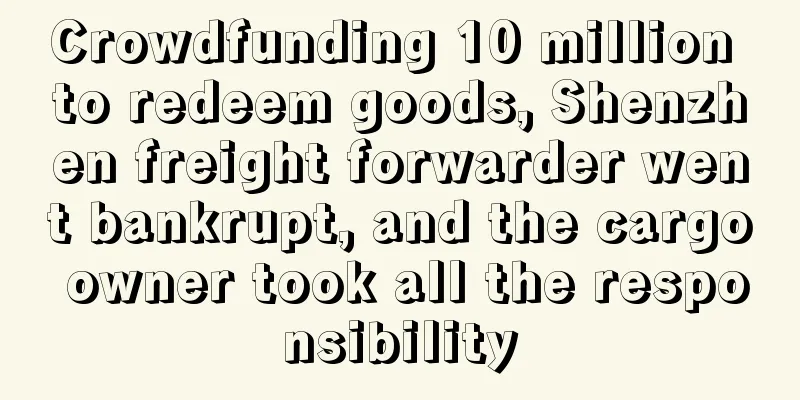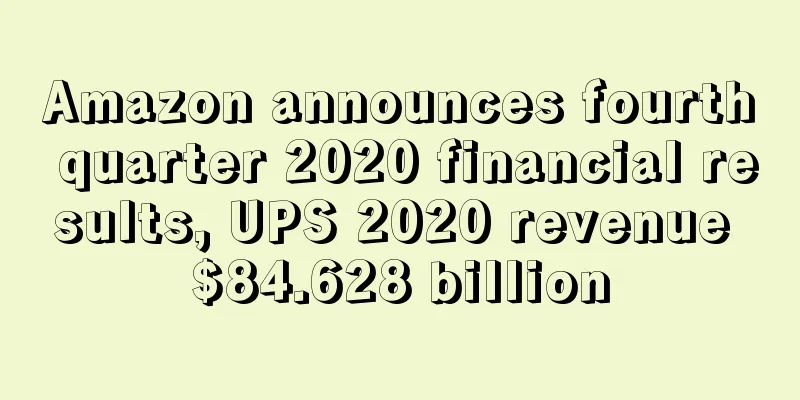Crowdfunding 10 million to redeem goods, Shenzhen freight forwarder went bankrupt, and the cargo owner took all the responsibility

|
There have been many thunderstorms in the logistics industry this year, and countless cargo owners have suffered behind each thunderstorm. Less than a month after the last company suspended receiving goods, another logistics company in Shenzhen, Eurasia* Railway, also suspended receiving goods.
When the news first came out, many people didn't pay much attention to it, but soon there was news that the company went bankrupt and a large number of containers were detained overseas, with a huge value of goods. According to past experience, after the goods were detained, the logistics company usually took the solution of asking customers to pay to redeem the goods. Now this familiar scene is staged again. The latest news is that Eurasia Railway wants to raise 10 million from the cargo owner to redeem the cargo.
The drama of raising money to redeem the goods reappears, this time the owner wants 10 million
On September 13, Eurasian Railways issued a notice to suspend receiving goods, saying that there were problems with its overseas UPS, DHL, and DPD accounts recently, which would take some time to resolve. It has decided to suspend receiving goods and resume receiving goods after the account is resolved. The specific time for resuming receiving goods will be notified separately.
Just looking at the notice, it didn't seem like a serious problem, so not many people paid attention to it at the time. But soon, news of the company's bankruptcy spread everywhere, saying that hundreds of containers had been seized, with goods worth tens of millions.
In order to verify the authenticity of the news, Yien.com immediately contacted the company on social media. The message showed "read", but no reply has been received so far. At the same time, the account was updated frequently before, basically once a day, but after the news broke, it stopped updating.
A few days later (September 20), a meeting record circulated in the industry further confirmed the previous rumors of the explosion and cargo seizure. The meeting minutes not only recorded in detail the number and location of the seized containers of Eurasia Railway, but also expressed the hope that the cargo owners could raise funds to redeem the goods.
It is reported that currently there are containers detained in Greece, Poland, Hamburg and Czech Republic, including those in transit, with a total of more than 80 containers involved. The freight forwarding company now has 8 to 9 million yuan in outstanding debts, but the total amount payable for all process outstandings, in-transit expenses, other delivery fees, etc. is still around 19 million yuan, leaving a gap of around 10 million yuan to be filled.
Ideally, if everyone participates in crowdfunding and does not abandon their goods, it will cost 10 yuan per kilogram to solve all the problems. If someone abandons their goods, the cost will rise to 15-20 yuan per kilogram. If the owner of the goods solves the problem by himself, the cost will be higher, and the cost will soar to 30-40 yuan per kilogram.
The minutes of the meeting emphasized that the money raised through crowdfunding will be deposited into a designated account and supervised by the sub-district office, and then a unified amount of money will be used to open up each link. This will minimize costs. If the cargo owners solve the problem on their own, not only will the cost be higher, but the cabinets that were seized at the scene earlier will also not be able to be taken out.
This action of the freight forwarding company has again attracted a wave of criticism from people in the industry.
“——This is obviously cutting leeks; ——They made so much money in the two years before the epidemic, and they are not willing to give back this little money; ——Now crowdfunding has become a must-have skill for freight forwarders. They make exaggerated promises before receiving the goods, and dare to promise anything. When something goes wrong, they use crowdfunding. "
The last European freight forwarder that asked the cargo owner to raise money to redeem the cargo was Quanyi Supply Chain. At that time, due to a broken capital chain, it asked the cargo owner to raise 4 million yuan to withdraw the cargo stranded at the port. This practice is equivalent to the cargo owner paying twice, so it is difficult for the cargo owner to accept this approach. I wonder if Eurasia*Tie can reach an agreement with the cargo owner this time.
Eurasia*Tie was established in 2017, with its headquarter in Shenzhen and a branch in Xiamen. In addition to being embroiled in a dispute over cargo detention, it is also involved in three lawsuits, all of which are defendants. It was sued by two freight forwarders in Shenzhen and Hunan over a freight forwarding contract dispute, and by a container leasing company in Chengdu over a lease contract dispute.
As a European market maker, the company must have a lot of cargo. It is conceivable that a large number of logistics companies and sellers have fallen into this trap. According to feedback, on the day the news came out, the goods in its warehouse that had not been shipped were quickly emptied by the cargo owners. Those who did not go through this channel were very grateful.
The water in Europe is deep, and some freight forwarders have lost tens of millions
Although the specific reasons for the Eurasian* Railway bankruptcy are unknown, freight forwarding on the European line generally cannot escape three situations: one is to solicit goods at low prices; the second is errors in the transportation process and a break in the capital chain; the third is customs clearance failure to comply with tax regulations.
Especially the third point, the collapse of many freight forwarding companies is related to it.
Double Clearance and Tax Package is a term often heard in international logistics. "Double Clearance" refers to customs clearance (declaration) in the exporting country and customs clearance in the destination country, and "Tax Package" refers to the tariffs and other taxes during customs clearance in the destination country. Currently, the double clearance and tax package on the market are basically gray operations, because the profit model of this model is to change the name of the goods, such as toys to daily necessities, or to declare a low value of the goods, so as to pay less or no tax, in order to obtain greater profits.
This operation is risky. Once it is checked, the release of the goods may be delayed. In serious cases, the goods may be required to pay additional taxes or have the goods detained. Freight forwarders often go bankrupt because they have to pay additional taxes or large compensation to the owners.
The "Belgian Liege" incident in March this year was caused by freight forwarders' tax evasion. This incident triggered a great turmoil in the logistics industry and many freight forwarders were hit hard. One freight forwarder said that his company paid tens of millions of yuan in compensation for this incident and is still recovering.
In this incident, the Belgian customs broker acting as a representative of the Chinese exporters improperly declared that Chinese goods entering through Liege Airport were destined for other EU countries and therefore enjoyed VAT import exemptions.
It is already an ideal situation if the freight forwarder is willing to pay compensation after an accident. In many cases, they just run away or go bankrupt.
The seller obviously knows the risks of double clearance and tax inclusion, but still chooses to ship the goods. There are only two reasons: on the one hand, it saves money. Double clearance and tax inclusion includes tariffs, value-added tax and other taxes in the freight, and the actual customs clearance is paid as a percentage of the value of the goods, which undoubtedly saves the seller a lot of money. On the other hand, it saves trouble. The European tax law process and customs clearance are complicated, and it is difficult for sellers to sort out and they have no energy to learn. However, with double clearance and tax inclusion, sellers only need to ship the goods, which is very worry-free. After paying the freight, they can put their time and energy into the operation of the store.
Under the double-clearance and tax-inclusive model, freight forwarders cannot make much money on the seller side. In addition, logistics prices are very competitive and profits are even thinner. The only way to make a profit is to avoid taxes. Europe's tax policies are complicated and the customs clearance environment varies greatly, which just gives freight forwarders a lot of room for operation. |
<<: Amazon sued three executives for tricking buyers into becoming Prime members
>>: Amazon seller randomly dumped 64 boxes of products and was exposed
Recommend
What is SINO? SINO Review, Features
SINO Group is China's leading cross-border dig...
Wayfair suffers four consecutive quarters of losses! Both active users and order volume decline
Recently, Wayfair, an American home furnishing e-...
What is sinco? sinco Review, Features
Sinco Food Equipment was founded in 2002 and has m...
Cut off Amazon's external links! Is TikTok's US store going to take off?
According to a new report from The Information , ...
What is Qingdao Sirui International Logistics Co., Ltd.? Qingdao Sirui International Logistics Co., Ltd. Review, Features
Qingdao Sirui International Logistics Co., Ltd. pr...
What is Tianji Network? Tianji Network Review, Features
Tianji Network is a professional one-stop solutio...
Amazon updates Amazon Pay dashboard, AliExpress adjusts EU multi-country logistics shipping rates
Amazon updates Amazon Pay dashboard According to ...
Sellers please note! Amazon US will launch a new self-delivery plan
Recently, Amazon US announced that in order to he...
Attention sellers: Registration for Amazon Japan Prime Day is about to end!
Every year, the biggest promotion that sellers lo...
A large number of sellers have transformed! Is there no future for selling goods?
Is distribution gradually being abandoned by the ...
What is SWIFT? SWIFT Review, Features
<span data-docs-delta="[[20,{"gallery"...
With explosive orders and fines, where will Temu semi-custodial sellers go?
Unlike the previous full-hosting model, the advan...
What is Aoji
AUKEY International was established in Hamburg, G...
Sold out! Many cross-border sellers achieved annual revenue of over 6 billion
Recently, many cross-border sellers announced the...
What is Made-in-China? Made-in-China Review, Features
Made-in-China is a large B2B trading platform head...









